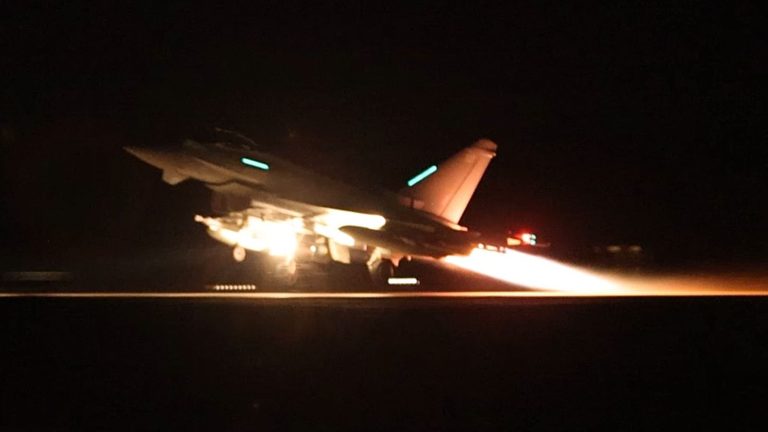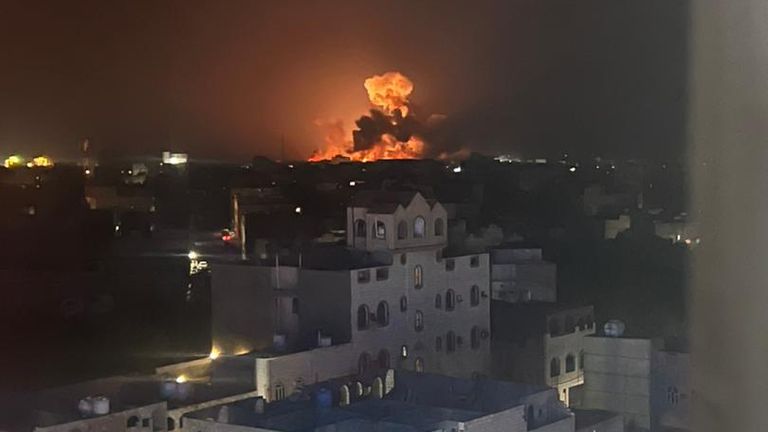The barrage of British and US air and naval strikes against the Iran-backed Houthis in Yemen is a calculated escalation to deter threats – but it could lead to a regional war.
The key test will be how the militants and their arch-patron, Tehran, respond. The Houthis were quick to claim that they would retaliate against American and British warships in the Red Sea.
Any major counterattack could push Western allies into direct confrontation with Iran, something both sides have said they want to avoid.
But this is already the most A dangerous expansion in violence The region has witnessed since Israel launched its war against Hamas in Gaza in response to the terrorist attacks that occurred on October 7. It significantly increases the risk of miscalculation, which could lead to uncontrolled escalation.
Middle East Crisis – Latest: US and UK “launch strikes against Houthi targets”
British Prime Minister Rishi Sunak described the intervention on Thursday evening as a “limited, necessary and proportionate measure of self-defence.”
Four Royal Air Force Typhoon aircraft participated in the training, along with American warplanes, warships and a submarine, armed with missiles and precision-guided bombs. Support was also provided by Australia, Bahrain, Canada and the Netherlands.
The UK said its aircraft used Paveway 4 bombs against two Houthi facilities.
One site, in northwest Yemen, called Beni, was used to launch reconnaissance and attack drones, while the other, at Abs Airport, was used to launch cruise missiles and drones over the Red Sea, according to a statement from the Ministry of Defense.
She added: “Several main targets were identified at the airport and were pursued with our aircraft.”
US President Joe Biden warned of more to come if threats to global shipping continue.
analysis:
The US and UK cannot allow one of their busiest shipping lanes to become the Wild West
“I will not hesitate to direct further measures to protect our people and the free flow of international trade as necessary,” he said.
The night raid on Yemen was inevitable since the Houthis, who control much of the country, defied a warning issued by the UK, US and 12 other countries on January 3 to stop attacking ships in the Red Sea.
The movement, which is armed by Iran, began targeting ships linked to Israel in October in protest against the war in Gaza, and has vowed to continue disrupting maritime traffic until the conflict ends.
They launched their largest missile and drone attack to date just days after the ceasefire ultimatum.
Such a challenge meant that failure to respond would have made the US-led coalition of allies appear weak and their threats meaningless.
Washington has learned at its expense the danger of allowing the enemy to cross the red line and then failing to make him pay the price after Barack Obama, as president, chose not to intervene militarily against Syria after its leader used chemical weapons against his own people in 2013.
Instead, Russia later mobilized its military forces to support President Bashar al-Assad, strengthening his efforts to crush the internal uprising. The Syrian dictator is still in power, and Moscow has increased its presence in the region.
Regarding Yemen, the decision to launch an attack in a region already teetering on the brink of a broader conflict amid Israel's war on Gaza represents a high-stakes balancing act.
If we hit the Houthis too hard, their supporters, most prominently Iran, will be forced to respond even more forcefully.
However, if the intervention is not strong enough, it will fail sufficiently to weaken the Houthis' military capacity and not deter further attacks against international shipping.
However, doing nothing was clearly not an option.


